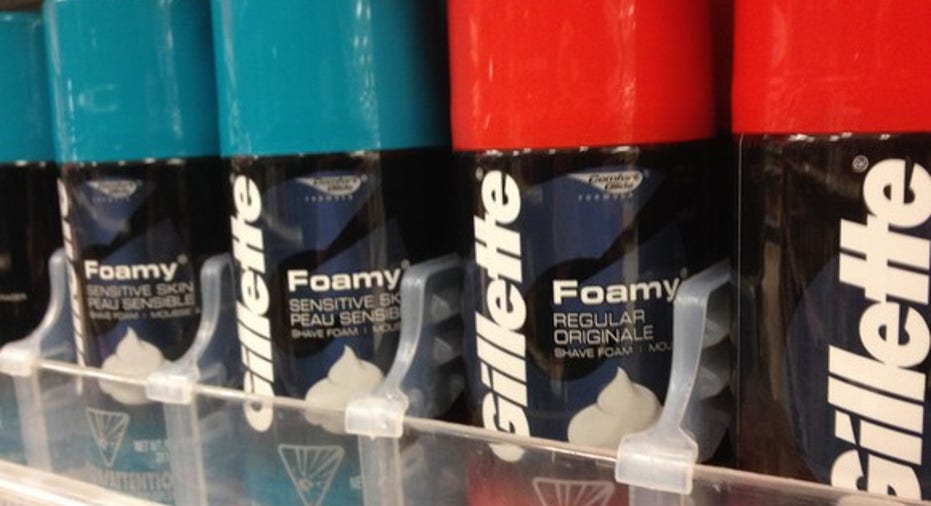Ignore Procter & Gamble: Here Are 3 Better Stocks

Image Source: Motley Fool.
Procter & Gamble(NYSE: PG) is a titan of the household products industry. The company is nearly 200 years old, worth more than $200 billion, and owns well-known brand names such as Tide, Gillette, and Pampers.
But the company has struggled recently. It's sold off secondary brands like Duracell, Cover Girl, and Zest to cut costs and focus on its core brands. Moreover, the company's once-strong pipeline of innovation has yielded little success, and spending on R&D as a percentage of sales is lower than it's been in almost any point in the last 20 years.The Crest-maker's sales have fallen as it has shed brands, struggled to grow domestic sales, and faced a strengthening dollar. The stock is up 12% this year, but the long term looks challenging.
Here are three similar stocks with better prospects than P&G.
1. Church & Dwight(NYSE: CHD)
The parent of Trojan and Arm & Hammer has been one of the strongest performers in the household products industry. The stock has more than doubled in the last five years, delivering solid earnings growth along the way. Unlike P&G, Church & Dwight derives the majority of its revenue from the U.S., meaning it's less susceptible to the currency volatility that's hit its larger rivals.
Despite its small size, the Trojan-maker has a better operating margin than P&G (19.9% versus 16.8%), and has been able to deliver steady growth through small acquisitions and by extending its Arm & Hammer brand into as many new products as possible, including toothpaste and deodorant. Its CEO has also said the company is looking at big acquisitions, and estimates it could spend as much as $2.8 billion on a target.
While I wouldn't expect another doubling from the stock in the next few years as its multiple has gotten inflated, I do think it will continue to outperform P&G, as it seems to be making the better strategic choices.
2. Unilever(NYSE: UL)
Arguably Procter & Gamble's biggest rival, Unilever is the next largest household products company after P&G. The European giant owns brands including Dove skin care products, Axe body spray, Hellmann's mayonnaise and Ben & Jerry's ice cream.
Today, both companies are similarly valued with P/E ratios of 24, and both offer 3% dividend yields. But while P&G has been dumping brands, Unilever has been snatching up some of the most promising growth companies in the sector. In July, it bought Dollar Shave Club, the start-up that became a significant rival to P&G's Gillette by offering discount, subscription razors. The deal should help Dollar Shave Club expand to new countries, improve distribution, and increase sales thanks to Unilever's marketing might.
Earlier this week, it snatched up green household products maker Seventh Generation for an undisclosed amount. That company generated more than $200 million in revenue last year,and it has seen double-digit compound annual revenue growth for the last 10 years. Environmental and e-commerce brands like Seventh Generation and Dollar Shave Club are growing fast, and in a slow-growth industry acquisition may be the best way to engineer profit growth.
3. Johnson & Johnson(NYSE: JNJ)
Among defensive dividend stocks, Johnson & Johnson has been one of the best picks on the market in recent years. The stock has nearly doubled in the last five years even as earnings growth recently slowed due to foreign currency headwinds and generic competition for Hepatitis C treatments. The company's three sectors -- consumer products, pharmaceuticals, and medical devices -- give it a diversification that's unmatched, and growth in healthcare is likely to beat household products over the coming years as baby boomers age and the Affordable Care Act lifts healthcare spending.
Johnson & Johnson pays a dividend yield of 2.6%, nearly as high as P&G, but its dividend has been growing faster than the Tide-maker's in the last two years as Procter & Gamble barely lifted its dividend 1% this year. Both companies are dividend aristocrats, but J&J is a bit cheaper at a P/E of 22.
As a megacap dividend aristocrat, Johnson & Johnson offers similar benefits to Procter & Gamble, but its strong position in healthcare should provide greater growth in the coming years as P&G futzes through its turnaround.
A secret billion-dollar stock opportunity The world's biggest tech company forgot to show you something, but a few Wall Street analysts and the Fool didn't miss a beat: There's a small company that's powering their brand-new gadgets and the coming revolution in technology. And we think its stock price has nearly unlimited room to run for early in-the-know investors! To be one of them, just click here.
Jeremy Bowman has no position in any stocks mentioned. The Motley Fool recommends Johnson and Johnson, Procter and Gamble, and Unilever. Try any of our Foolish newsletter services free for 30 days. We Fools may not all hold the same opinions, but we all believe that considering a diverse range of insights makes us better investors. The Motley Fool has a disclosure policy.



















